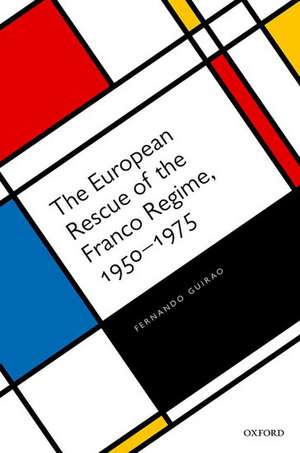The European Rescue of the Franco Regime, 1950-1975
Autor Fernando Guiraoen Limba Engleză Hardback – 28 ian 2021
Preț: 736.88 lei
Preț vechi: 989.80 lei
-26% Nou
Puncte Express: 1105
Preț estimativ în valută:
141.00€ • 147.59$ • 117.36£
141.00€ • 147.59$ • 117.36£
Carte disponibilă
Livrare economică 27 februarie-05 martie
Preluare comenzi: 021 569.72.76
Specificații
ISBN-13: 9780198861232
ISBN-10: 0198861230
Pagini: 496
Dimensiuni: 165 x 240 x 35 mm
Greutate: 0.91 kg
Editura: OUP OXFORD
Colecția OUP Oxford
Locul publicării:Oxford, United Kingdom
ISBN-10: 0198861230
Pagini: 496
Dimensiuni: 165 x 240 x 35 mm
Greutate: 0.91 kg
Editura: OUP OXFORD
Colecția OUP Oxford
Locul publicării:Oxford, United Kingdom
Recenzii
Through its well-focused analytical framework and highly detailed description, this volume is an important read for anyone interested in Spain's modern political and economic history, developmental details of the European Union, and, more generally, international political economy regarding trade relations in Europe.
Fernando Guirao builds on his earlier work on post-1945 Francoist foreign and economic policy to make a convincing argument that Spain more than held its own in negotiations with the EEC, and indeed set the terms for those talks to some degree...The transformation of the Spanish economy from a poor, closed system to an open, growing and increasingly consumerist society was too alluring for the EEC to be concerned with politics. Guirao's economic research and his use of statistics and charts to show the economic promise and results of this situation reinforce a clear, well written, and important argument.
The author has a knack for telling the tale while at the same time offering a useful guide to the complex decision making of the evolving European institutions. The book is also remarkable for the sheer number of new primary evidence pieces uncovered...In addition to skillfully covering the detailed back and forth on trade negotiations, it also provides a truly novel interpretation of events. It is this dual contribution that makes this book particularly valuable and engaging. This volume is not only essential for students of Spain but also has critical insights for those interested in the interplay between seemingly weak countries and supra-national bodies...The book is a tour de force.
Fernando Guirao builds on his earlier work on post-1945 Francoist foreign and economic policy to make a convincing argument that Spain more than held its own in negotiations with the EEC, and indeed set the terms for those talks to some degree...The transformation of the Spanish economy from a poor, closed system to an open, growing and increasingly consumerist society was too alluring for the EEC to be concerned with politics. Guirao's economic research and his use of statistics and charts to show the economic promise and results of this situation reinforce a clear, well written, and important argument.
The author has a knack for telling the tale while at the same time offering a useful guide to the complex decision making of the evolving European institutions. The book is also remarkable for the sheer number of new primary evidence pieces uncovered...In addition to skillfully covering the detailed back and forth on trade negotiations, it also provides a truly novel interpretation of events. It is this dual contribution that makes this book particularly valuable and engaging. This volume is not only essential for students of Spain but also has critical insights for those interested in the interplay between seemingly weak countries and supra-national bodies...The book is a tour de force.
Notă biografică
Fernando Guirao is Jean Monnet Professor of European Integration History at Pompeu Fabra University, Barcelona (with an ad personam chair since 2013), Deputy Director of the Barcelona Center for European Studies, and member of the European Union Liaison Committee of Historians and of the editorial board of the Journal of European Integration History. Guirao has been visiting scholar at the universities of Nantes (2016), Seoul National (2009), Oxford (1997), LSE (1995), and Yale (1992-94).
